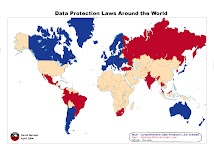For the longest time, HR departments in the City have debated as to whether the FSA requires criminal checks. Often, they decide not to do them and they leave it up the the applicant to disclose any criminal history on their FSA form A. Finally, the FSA has revealed a clear policy. City firms are responsible for doing CRB checks on their approved persons. So, if you are still on the fence, read on:
_____________________________________________________________________
Powerchex Warns of the Risk of Insufficient Background Checking
after The FSA takes Action
Insurance Brokerage Firm penalised for failing to conduct basic checks
London, 3rd December 2009. The Financial Services Authority has banned two insurance
brokers for colluding to conceal a criminal conviction. The FSA also cancelled permission for an Insurance Brokerage firm to carry on regulated activities.
Margaret Cole, the FSA’s director of enforcement and financial crime, said:
“We have made examples of [these parties] to send a warning to firms and
individuals: do not lie to the FSA. This case, and others that are due to follow, serve as a clear signal about the consequences of giving anything less than full and frank disclosure of material information to the FSA.”1
Alexandra Kelly, a director of pre‐employment screening firm at Powerchex, believes that the Insurance brokerage firm engineered its own downfall; “The FSA is explicit that it expects firms to conduct checks on individuals applying to work in controlled functions. This unsurprisingly includes criminal record checks as standard. Had the firm in question conducted such checks, the FSA would have had no cause to take such drastic action.”
In this particular case, one of the brothers had applied for a controlled function having recently been convicted of conspiracy to defraud. On his FSA application, he signed a declaration that he had no previous criminal convictions, and was not the subject of any current criminal proceedings. His brother helped conceal the conviction from the FSA, despite occupying a regulated role himself and knowing the risks this involved.
“Sadly it is no longer enough for firms to simply ask their employees to sign a declaration stating that they do not have any criminal convictions,” continues Kelly. “Especially for those individuals applying for controlled functions, it is critically important that relevant identity,credit and criminal record checks are conducted as an absolute minimum. In this particular case, failure to do so has resulted in the cancellation of permission from the FSA to carry out regulated activities. I think this ruling will cause a lot of firms to sit up and take notice.”
Subscribe to:
Post Comments (Atom)




1 comment:
Nice blog! Really very useful information you share!
Get more information on Pre Employment Screening* then visit now.
Post a Comment